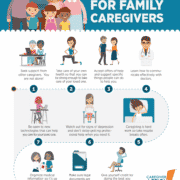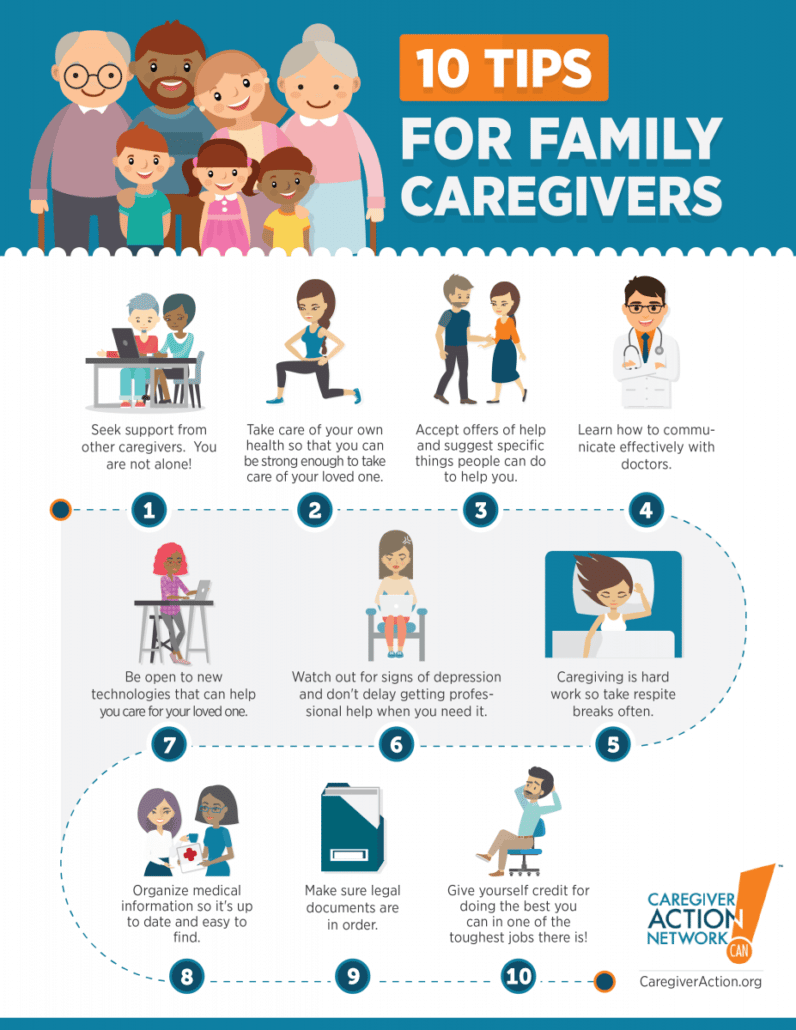10 Tips for Family Alzheimer’s Caregivers
Family Alzheimer’s Caregivers – Especially Women – Need Self-Care
According to the National Institute on Aging, there are an estimated 11 million unpaid family Alzheimer’s caregivers in the United States for patients with dementia, including the most prominent form of the disease, which is Alzheimer’s disease.
More than one in four Alzheimer’s and dementia caregivers are both caring for a child or grandchild AND for someone with dementia at the same time; they are the “sandwich generation.” Over 66 percent of caregivers are women with nearly 50% looking after at least one parent or in-law. Self-care for these family caregivers – is extremely important not only for themselves but also for their charges. We’ve found a resource for caregivers called the Caregiver Action Network (CAN) which is an excellent organization to find more information, network, and participate in support forums.
Caregiver Action Network (CAN)
CAN is the nation’s leading family caregiver organization working to improve the quality of life for the more than 90 million Americans who care for loved ones with chronic conditions, disabilities, disease, or the frailties of old age. CAN serves a broad spectrum of family caregivers ranging from the parents of children with significant health needs, to the families and friends of wounded soldiers; from a young couple dealing with a diagnosis of MS, to adult children caring for parents with Alzheimer’s disease. CAN (the National Family Caregivers Association EIN 52-1780405) is a non-profit organization providing education, peer support, and resources to family caregivers across the country free of charge. Here are some quick tips with links to their site for more in-depth articles, plus a shareable infographic.
10 Tips for Alzheimer’s Caregivers
- Seek support from other caregivers. You are not alone!
- Take care of your own health so that you can be strong enough to take care of your loved one.
- Accept offers of help and suggest specific things people can do to help you.
- Learn how to communicate effectively with doctors.
- Caregiving is hard work so take respite breaks often.
- Watch out for signs of depression and don’t delay getting professional help when you need it.
- Be open to new technologies that can help you care for your loved one.
- Organize medical information so it’s up to date and easy to find.
- Make sure legal documents are in order.
- Give yourself credit for doing the best you can in one of the toughest jobs there is!
CAN Offers A Caregiver Help Desk:
- Have confidential conversations with caregiving experts about your caregiving questions
- Reach out by phone, email and live chat—whatever is most convenient for you
- Access experts Monday through Friday, from 8:00 AM – 7:00 PM Eastern time.
For More Information Family Alzheimer’s Caregivers Can Contact CAN:
Caregiver Action Network
Caregiver Help Desk: (855) 227-3640
Office Phone: (202) 454-3970
E-mail: [email protected]
(Read also: Compassion Fatigue – What is it?)
Learn more about Cadbury Common’s Memory Care Program >




You must be logged in to post a comment.